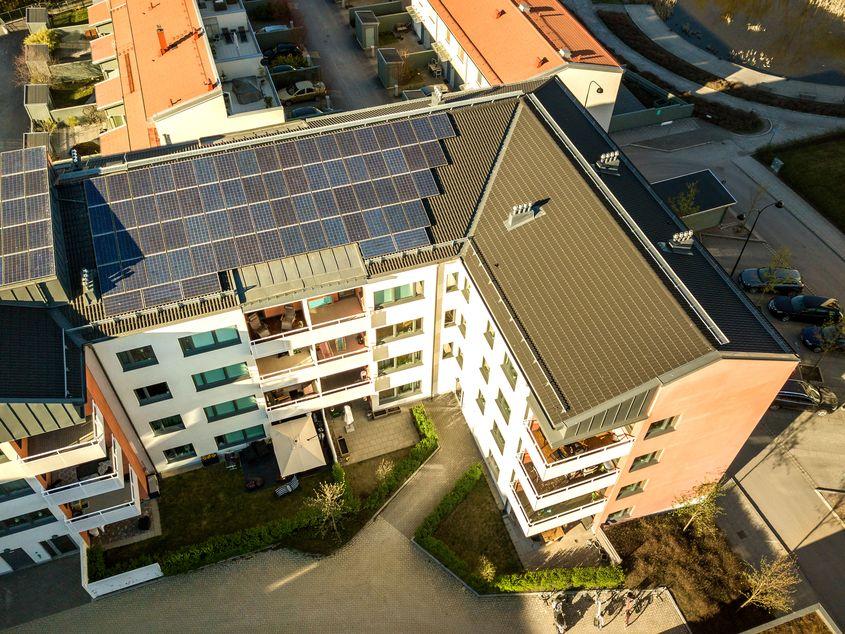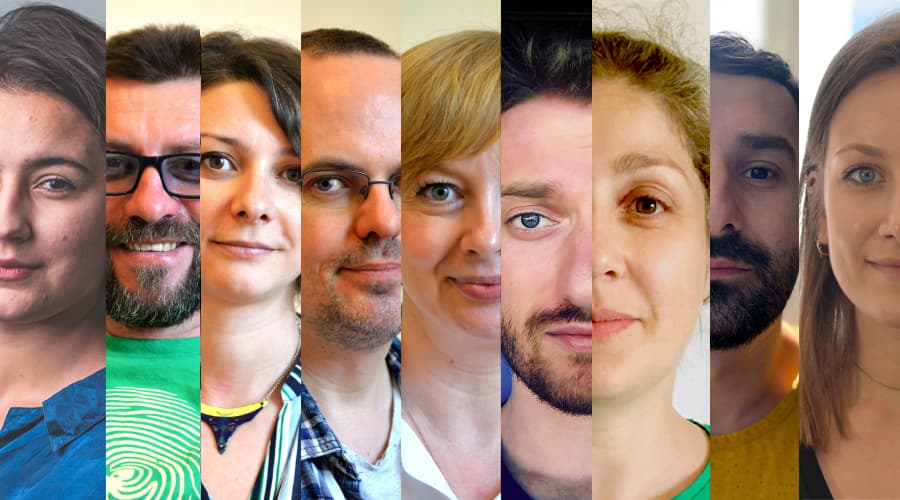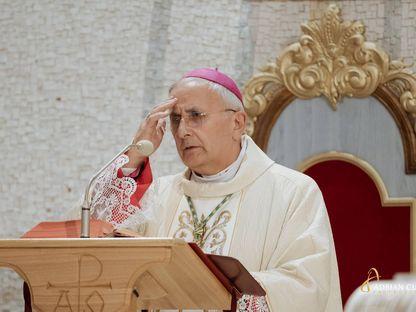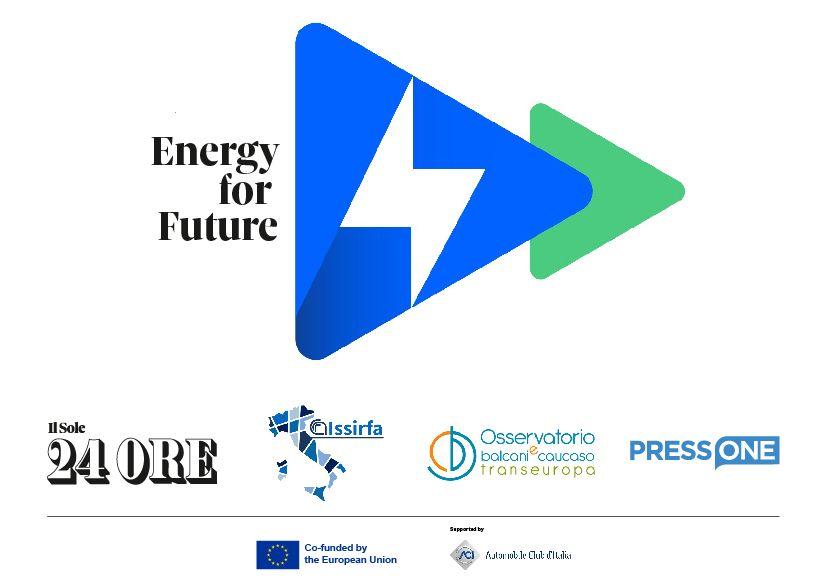Romania could access European funds to support energy communities that contribute to the energy transition to renewables, but this cannot happen until the authorities regulate an operating framework. Photo © Andrii Biletskyi | Dreamstime.com

Romania could access European funds to support energy communities that contribute to the energy transition to renewables, but this cannot happen until the authorities regulate an operating framework. Photo © Andrii Biletskyi | Dreamstime.com
18/06/2024
Energy Communities That Could Lower Romanians' Electricity Bills, Put on Hold by Authorities
A homeowners association in the Apusului area of Bucharest has installed 15 photovoltaic panels on the roof of the building. Since then, the energy bill for communal consumption has been zero. The Apusului association represents a so-called "energy community," a collective that produces, manages, and consumes green energy together.
Why together? There may be cases when a person cannot, for technical reasons, become a prosumer. However, they may have a neighboring company with available land to install solar panels and, together, produce and consume green energy. Thus, the energy transition becomes democratized, energy bills decrease significantly, and dependence on traditional suppliers also diminishes.
Romania could access European funds to support energy communities contributing to the energy transition towards renewable sources, but this cannot happen until authorities regulate an operating framework. For that, experts say, a special law is not needed, but a regulation drawn up by the national energy regulator will suffice.
- The EU's direction when it comes to transitioning to renewable energy sources emphasizes citizen involvement. One of the EU's goals is to have at least one energy community in every town with at least 10 000 inhabitants by 2025.
- For such communities to exist in Romania, a favorable legislative framework is needed. Currently, there is only one emergency ordinance that merely translates the text of the European directive that formed the basis of the energy communities, which is insufficient for practically establishing an association, experts warn.
- Even without a dedicated law, energy communities could have been encouraged to form through a simple regulation by the National Energy Regulatory Authority, experts say. This has not yet happened, despite the European directive existing since 2018, and Romania could have accessed European funds dedicated to energy communities.
- While there are over 9,000 such communities in the EU, in Romania, there are 21 in various stages of development.
- PressOne asked several experts in the field how Romania's transition to green energy could be stimulated with the help of energy communities and what legislative changes are necessary for this to happen.
The Sun from Apusului
Aurel Bratu is the president of the homeowners association in the Apusului area, Sector 6 of Bucharest. In 2022, he heard that the ÎntreVecini association launched a competition for block residents to become prosumers. Out of over 80 associations enrolled in the project, the one in Apusului won, and 15 photovoltaic panels were installed on the building's roof.
Mulți ne citesc, puțini ne susțin. Fără ajutorul tău, nu putem continua să scriem astfel de articole. Cu doar 5 euro pe lună ne poți ajuta mai mult decât crezi și poți face diferența chiar acum!
"We had one or two votes against the project. People said the building's roof would be damaged. Or that the panels would fly off," Aurel recalls.
Not only did the panels not fly off, but they also started producing electricity to power the building's common areas, resulting in zero electricity bills.
"The bill has been in the negative since the panels were installed. We have ensured lighting for the building's staircase, intercom, and video cameras. We also have various major rehabilitation works, such as replacing columns, which we power from the same socket (i.e., the photovoltaic panels)," explains the president of the Apusului homeowners association.
Energy Community = ?
Just as a group of people can decide to collectively use land to grow vegetables for the benefit of all group members, they can also decide to collectively produce, manage, or consume green energy, explains Andrei Crăciun, campaign coordinator at Greenpeace.
Predator in Robes: The Diocese of Iași and the Vatican Buried a Sexual Assault Committed by a Catholic Priest Against a Minor in Bacău, Failing to Alert Prosecutors
A Roman Catholic priest abused a 13-year-old girl in the parish where he served in Bacău County: the bishop of Iași knew about it, sent the case to the Vatican, and applied canonical sanctions, but did not notify the authorities, who only intervened later and sentenced him to prison.
"Citizens come together, form a collective, and can bring other entities into this collective, such as a municipality, a small company, or an organization. Together, they manage or consume renewable energy from photovoltaic, wind, or geothermal sources," Andrei adds.
But how is the energy produced collectively distributed among community members? The simple answer is equally. The less simple answer is: according to community decisions. Depending on how the project was funded, how investment recovery is desired, or how the energy produced is to be valued, the community reaches an agreement.
"I'll use myself as an example. Let's say I consumed 100 kW in a month. Of these 100 kW, I received 80 from what I produced together with my neighbors. And I had a difference of 20 kW that I had to purchase from the market. But what we produce as a block is shared equally among all neighbors, and everyone is entitled to a portion of what is produced," explains Andrei.
Un newsletter pentru cititori curioși și inteligenți.
Sunt curios
Simple Prosumer vs. Energy Community
In Romania, the number of prosumers has started to increase significantly. In 2018, there were 0 prosumers connected to the grid; by the end of the year, according to the president of ANRE, this number could reach 200,000. In this context, energy experts emphasize that the next step should be energy communities.
"There are many cases where someone cannot install a photovoltaic panel on their roof because they live in an apartment building, maybe there isn't enough space, the roof isn't suitable, or they live in a historic area, but they would like to produce their own energy in some way. And then maybe a neighbor has available land or a roof, and they together form a kind of collective prosumer," says Corina Murafa, a green energy expert.
Energy communities, she adds, have the great advantage of balancing production and consumption curves, ensuring economic efficiency.
"Maybe my solar panel produces energy, but I'm not home to consume it. However, maybe my neighbor is, and we end up exchanging energy between us. This way, I, as a community member, benefit because I can capitalize on the energy produced collectively, and my neighbor benefits too, as they may not cover their own consumption with their share, or they have higher consumption, and the energy price from the community is much lower than on the market," explains the expert.
Less money on the bill
Studies conducted in several countries and on various energy community models show that the economic efficiency of the community model is higher than that of individual prosumers. A European average indicates a 62% reduction in bills compared to the same bill from a commercial supplier.
Moreover, network imbalances caused by the increasing number of prosumers injecting surplus energy will be less likely. The more diverse the energy community, with more actors from public institutions to household consumers or small factories, the better the network is balanced.
Energy communities can also actively contribute to combating energy poverty, considering that a 2019 study shows that for over 45% of Romanians, the energy bill is too high a burden.
"In energy communities established by municipalities in Spain or Greece, it is stipulated that a certain number of community members must come from vulnerable families. This is to include and bring together even the most vulnerable," explains Andrei Crăciun from Greenpeace.
From Theory to Practice
For Romania, a significant current issue is the lack of a regulatory framework dedicated to energy communities. In 2022, more than four years after the European directive on renewable energy sources was issued, the Romanian government drafted an emergency ordinance in this regard.
"This European directive was taken and translated from English into Romanian and put into an emergency ordinance. This is a step forward, a legislative point to refer to, but not enough for me, as a citizen or a homeowners association in a Bucharest block, to practically establish an energy community," adds Crăciun.
What is missing? The operationalization of the ordinance through secondary regulations by ANRE, changes in the energy and local public finance laws, or ultimately, the drafting of a special law dedicated to energy communities, explaining how things work, experts consulted by PressOne believe.
This is why the energy community in the Apusului area of Bucharest can only use the energy produced by the panels on the building's terrace for communal consumption, and the money entering the association's accounts for surplus energy injected into the grid can also only be used for repairs or investments made on behalf of the homeowners association.
"In apartment buildings, implementing an energy community is the simplest. Once energy sharing is allowed (currently not permitted here), people will be able to fully cover both individual and communal consumption with what they install on a roof," says Corina Murafa, a green energy expert.
Although the emergency ordinance includes the notion of energy sharing, ANRE lacks a methodology for its practical implementation. For this, no special law is needed, just changes in secondary legislation.
"An ANRE regulation stating that energy sharing within the energy community is done according to allocation keys would suffice. Currently, ANRE doesn't say you can collaborate with the energy supplier and provide them with your community members' list, with the energy injected into the grid by the community, which the supplier would then deduct from the community members' bills, each member's share of what was injected with the rooftop panels," adds Corina Murafa.
Regulatory Authorities' Reluctance?
Why hasn't ANRE changed the legislation in the two years since the emergency ordinance was issued, so energy communities have a basis to develop? This is despite the European Commission providing ANRE with all the necessary knowledge and constant experience exchanges with other regulatory bodies in countries where energy communities thrive.
"I can only speculate a lack of will. And the lack of will comes from the fact that this type of model disrupts the energy market and eats into the market share of traditional suppliers. Just as prosumers eat into traditional suppliers' market share and face obstacles in all possible directions, with delayed settlements and reports.
We are talking about 9,000 energy communities in the EU, with the same regulations, cables, and operating principles. How can it work there and not here? I don't think it's a matter of capacity or know-how anymore; it's already a matter of bad faith," says Corina Murafa, a renewable energy expert.
Missed Opportunities
Without a regulatory framework, those interested in forming an energy community cannot access European funds for this purpose. For example, the six counties benefiting from the Just Transition Program funds (Dolj, Gorj, Galați, Hunedoara, Mureș, Prahova) could launch a series of project calls dedicated to energy communities.
"We worked with these counties to create their operational plans for a just transition, and it is specified that the funds can be used to create energy communities. If a legal framework were established soon, when these counties develop their guides and funding calls, they could also launch calls for funding for energy communities," says Andrei Crăciun from Greenpeace.
European funds for energy communities would have also been available through the REPowerEU component, but Romania could not access them due to a lack of legislation.
"Romania had a chance, which it missed. At one point, in an intermediate version of REPowerEU, Romania committed to energy communities as a reform and requested free technical assistance worth one and a half million euros from the European Commission. This was not included in the final version of REPowerEU," concludes Corina Murafa.
___
This article is published as part of the Energy4Future project, co-funded by the European Union. The European Union is not responsible for the information and opinions expressed during this project and article. Responsibility for the content lies entirely with PressOne.

Avem nevoie de ajutorul tău!
Mulți ne citesc, puțini ne susțin. Asta e realitatea. Dar jurnalismul independent și de serviciu public nu se face cu aer, nici cu încurajări, și mai ales nici cu bani de la partide, politicieni sau industriile care creează dependență. Se face, în primul rând, cu bani de la cititori, adică de cei care sunt informați corect, cu mari eforturi, de puținii jurnaliști corecți care au mai rămas în România.
De aceea, este vital pentru noi să fim susținuți de cititorii noștri.
Dacă ne susții cu o sumă mică pe lună sau prin redirecționarea a 3.5% din impozitul tău pe venit, noi vom putea să-ți oferim în continuare jurnalism independent, onest, care merge în profunzime, să ne continuăm lupta contra corupției, plagiatelor, dezinformării, poluării, să facem reportaje imersive despre România reală și să scriem despre oamenii care o transformă în bine. Să dăm zgomotul la o parte și să-ți arătăm ce merită cu adevărat știut din ce se întâmplă în jur.
Ne poți ajuta chiar acum. Orice sumă contează, dar faptul că devii și rămâi abonat PressOne face toată diferența. Poți folosi direct caseta de mai jos sau accesa pagina Susține pentru alte modalități în care ne poți sprijini.
Vrei să ne ajuți? Orice sumă contează.
Share this



